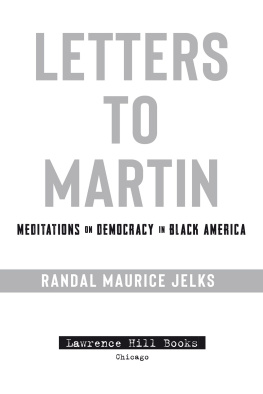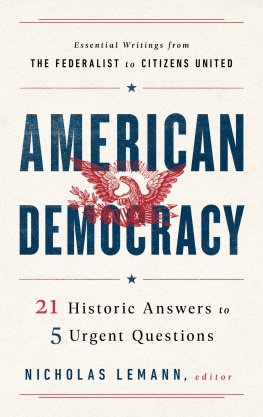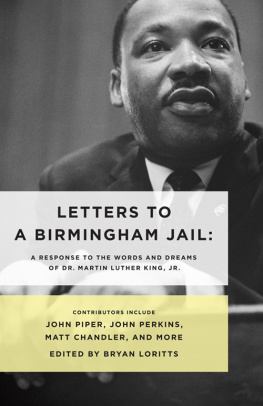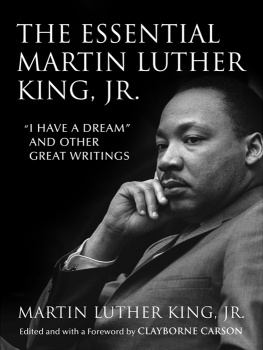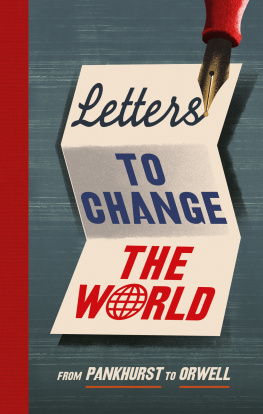Sommaire
Pagination de ldition papier
Guide
Copyright 2022 by Randal Maurice Jelks
All rights reserved
Published by Lawrence Hill Books
An imprint of Chicago Review Press Incorporated
814 North Franklin Street
Chicago, Illinois 60610
ISBN 978-1-64160-557-1
Library of Congress Control Number: 2021946428
Typesetting: Nord Compo
Printed in the United States of America
5 4 3 2 1
This digital document has been produced by Nord Compo.
To
Lerone Bennett Jr.
(October 28, 1928February 14, 2018)
Your Ebony magazine features instructed me
in the artful lyricism of a peoples history.
Jess Gill
(February 24, 1932April 4, 2001)
My uncle, I love you more today than yesterday.
You stood alongside Martin and fathered me
when I needed it most.
Dr. Darlene Clark Hine
My PhD mentor who insisted that Black womens histories
reconfigured US history itself.
Edward Nelson III
(March 16, 1928June 13, 1989)
My beloved Uncle June, the first man in my life,
you taught me quiet determination and dignity to overcome.
Every morning I wake up I am reminded
to imitate your courage.
Prologue
The Constitution
A noble piece of paper
With free society
Struggled but it died in vain
GIL SCOTT-HERON, WINTER IN AMERICA
Martin,
In late 2016, I was invited to Elmhurst College, the alma mater of two great theologians, brothers H. Richard and Reinhold Niebuhr. Their legacies in academia and in public life still resonate. They were, of course, titans in your student years at Crozer Seminary and Boston University. Their books were required reading. As your fame rose, you would have occasion to converse and correspond with the both of them. So I was deeply honored to be invited to this small college that shaped these two vitally important theologians who influenced your thought.
It was a propitious moment. The country had been shocked by the presidential election of 2016. Like the presidential election of 2000, the forces of conservatism that began with the election of Ronald Reagan in 1980 still vice-gripped political power. The election of Donald J. Trump was the apotheosis of Reagan-era conservatism. Both Reagan and Trump were masters of television, and they both used it to reward the superrich. While Ronald Reagan won his election with the legitimacy of an overwhelming majority of the American voters, Trump lost the popular vote by two million but won the electoral college, assuring him the presidency. His presidency, like that of former president George W. Bush in 2000, had an air of illegitimacy. In 2000, the Supreme Court awarded the election to Bush over his opponent Al Gore, instead of ordering Florida to have an extensive recount. It left the nation in a tizzy. The Bush administration used the courts decree to nearly ruin the country in an inadvisable war, worse than Vietnam. Bush forty-threes global aggression and domestic flubs were so reckless they opened up the lane for Barack Obama to be elected as the countrys first African American president.
The Obama administration was deliberate and overall above reproach when it came to scandals within his administration. His presidency was No drama Obama! The problem for President Obama was that he was unwilling to be Machiavellian against his GOP opponents at the start of his administration. He thought being a Black patrician necessitated honorable politics. Though Obama was an outstanding steward of the office, his politics did not make his opponents, or his allies, fear him. Further, he allowed the Tea Party to fester. The Tea Party was funded by some of the countrys wealthiest families, who were looking to end the limited social safety net of Franklin Roosevelts New Deal and its expansion under Lyndon Johnsons Great Society program. This was a long-term strategy that of course required dominating the federal courts with conservative appointees. These moguls of finance, media, and technology, using Orwellian doublespeak, pushed monopoly as free enterprise. Obama responded carefully and responsibly, but not aggressively. His noblesse-oblige style of politics did not serve his rainbow coalition or hold them together after he left office.
Obama supported his former secretary of state, Hillary Clinton, who by all measures was more qualified than any of her male counterparts. The problem for Clinton was her political tin ear and her past politics tied to her husbands moderate conservatism. In 1992 Bill Clinton ran as a Walmart Democrat, a southern politician who recognized that, to get elected, he had to accept a low-wage service economy. He won, but his policies tended to favor corporate and financial sectors over labor. He was friendly, but at a distance, with organized labor. In addition, fearing his GOP opponents, he signed into law the Personal Responsibility and Work Opportunity Reconciliation Act. This draconian crime bill put the onus on women alone to take care of their children, with limited support from the state in terms of public education and access to childcare. This bill was baked with sexist flour and decorated with racist icing and welfare-queen figurines. It was a bootstraps approach to the economic deindustrialization that had begun tearing through all sectors of working-class America in the late 1970s. Construed with racist and sexist bias, the bill harmed the Black communities who overwhelmingly voted for Clinton.
Hillary Clinton was the bearer of her husbands legacy, and she had no good defense of his or her former actions in the wake of Michael Brown Jr.s murder by police in Ferguson, Missouri. They had asked Black voters to vote for them, but their policy actions did the greatest harm to a community that was the most loyal to the Democratic Party. Black people, both as a racial group and as working-class constituents, lost with the policy conservatism of the Democratic Leadership Council. Hillary Clintons campaign stumbled in 2008 against Obama, and once more it stumbled in 2016. She was unable to address her own past policy decisions robustly, especially when it came to race and class status. In addition, conservative propaganda spewed enough misogynistic tales that blurred who she really was as a candidate. Though Clinton won the popular vote by two million, she lost the electoral college to Trump. She failed to speak to the woes of the working classes and lost the Great Lakes states. Her loss was crushing.
I was invited to Elmhurst College a few weeks after President Trumps inauguration to office. In the quarters I keep it was a dispiriting time. So I wanted to say something hopeful to the young people that I would address. I wanted them to know that democracy in the United States has always been difficult to secure. It is a constant fight. Like Reinhold Niebuhr I believe democracies are not always assured. He knew this from witnessing the rise of Nazism in Germany and a totalitarian form of communism in the Soviet Union. Niebuhr was right to be theologically pessimistic. Human self-aggrandizement throughout recorded history is a constant reality. It is a reality being witnessed today in every outsized leader who manages to control state power and enshrine themselves monarchically. However, different from Niebuhr, I recognize that hope and struggle are central to our sojourn as a people. Our collective sojourn demands that we think about ways to create a better democracy. Our forebearers stubbornly held onto the idea that freedom of the self and self-governance are sacred realities. They are to be cherished. They are sacred because our freedoms have always been tenuous and always in jeopardy. This has been central to our spiritual histories.
So the day I arrived at Elmhurst I wanted to acknowledge Reinhold Niebuhrs clear-eyed pessimism but also center the hope that you embodied. In my mind, you personified many of the central spiritual themes of Black histories. In your sermonic mobilizations, you called us to resist an all-encompassing, dehumanizing political apartheid. As you learned from your mentors, this struggle was to overcome disfigurement of the self, as well as a disfigured society. This struggle was always as much spiritual as it was material.

